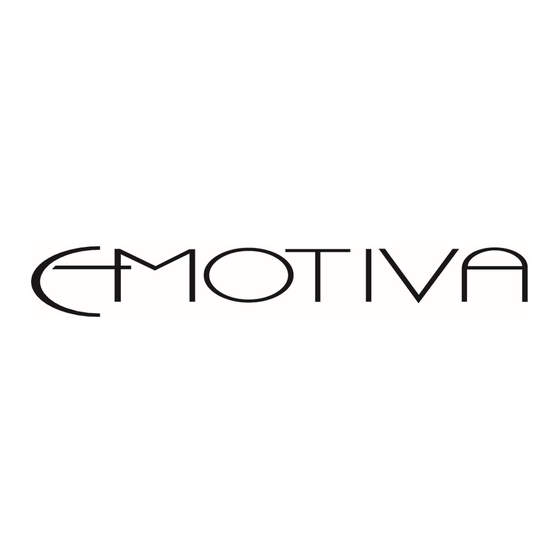
Table of Contents
Advertisement
Quick Links
Advertisement
Table of Contents

Summary of Contents for Emotiva Little Ego
-
Page 2: Quick Start
5. Headphone Output (analog) Quick Start If you have an Apple computer, just connect the USB Input on your Little Ego to an available USB port on your computer, and plug in your headphones. If you have a Windows computer,... - Page 3 Connecting Your Little Ego To a Computer Headphone Output Your computer thinks of your Little Ego as a sound card. You can connect it to any computer that has a free USB port and can support an external USB sound card. You’ll be able to play anything through your Little Ego that you can play on your computer.
- Page 4 Little Ego won’t mess up the sound quality at all. If you connect your Little Ego to a device that has its own volume control, just set the volume control on your computer and your Little Ego about two thirds of the way up so it doesn’t...
- Page 5 Using Little Ego With Your Apple Computer Apple computers already have the drivers they need to use your Little Ego. All you need to do is to tell your computer to use your Little Ego as its sound card. Once you do that, your computer will usually play through your Little Ego when it’s plugged in, and play through its internal speakers when...
- Page 6 If you only play files below 96k, or you’re using your Little Ego on a friend’s machine, your Little Ego has a special mode that supports up to 96k without having to install drivers. To use this Driverless Mode, all you need to do is press and hold down the Filter Selector Switch while connecting Little Ego to your computer.
- Page 7 To tell your Windows 7 computer to use Little Ego: • Connect your Little Ego to a USB port on your computer. . • On your computer, open Control Panel. • Click on Hardware and Sound. • Under Sound, click on Manage Audio Devices.
-
Page 8: Windows Computers
The Sample Rate LEDs on your Little Ego always display the sample rate of the audio the Little Ego is receiving. If you’re playing a high resolution audio file, but the Little Ego is only receiving 44k, then your computer probably isn’t configured... - Page 9 UAC2 are built into all modern Apple computers, but not into Microsoft Windows, which is why you have to install our drivers to unleash the full potential of the Little Ego with a Windows computer. Some versions of Linux also support UAC2, but not all.
- Page 10 Select Switch repeatedly to cycle through the available filters. Within a few seconds after you stop pressing the button, your Little Ego will switch to the new filter, and resume normal operation. You will hear a slight period of silence when the filter switch occurs.
- Page 11 About Pre-Ringing and Post-Ringing In order to facilitate converting digital audio into analog as accurately as possible, the Little Ego uses what’s known as an oversampling filter or interpolation filter. While this filter causes no audible alteration of steady Theoretical...
- Page 12 Little Ego with regular loudspeakers. Digitally Controlled Analog Volume Control To take full advantage of the Little Ego’s high quality digitally controlled analog volume control, you should leave your player program’s Volume Control set to 100% and use the computer’s System Volume Control to adjust your audio...
-
Page 13: Digital Audio
What You Need to Know About Digital Audio What is Sound? The sound we hear is made up of tiny changes in air pressure. Our ears detect these minute changes and transmit them to our brain, which interprets them as sound. When we make an audio recording, these changes in air pressure are represented by changes in voltage. -
Page 14: The Basics
we end up with a very good reproduction of our original analog audio signal. The math involved can get complicated, but you don’t need to know that part to enjoy digital audio. The Basics How often we take a measurement is known as the sample rate. - Page 15 The Little Ego supports all standard sample rates between 44k and 384k, and all standard bit depths from 16 bits to 32 bits. The row of LEDs on your Little Ego show you the sample rate of whatever is currently playing, so you’ll always know exactly what your computer is sending to your Little Ego.
- Page 16 - although you do need to configure them correctly to get the best results. You also need playback hardware that can convert those superb quality high res files back into analog audio at the best quality possible. Luckily you have a Little Ego!
-
Page 17: Specifications
Specifications USB Interface: Asynchronous (UAC1 and UAC2) Format: PCM digital audio. Audio File Formats Supported: Little Ego supports any file or stream format your computer can play. Digital Filter Options: Symmetrical; Asymmetrical Low; Asymmetrical High. Maximum Output Level: 1.8 VRMS Sample Rates Supported: Apple computers: 44.1k - 384k (no drivers required). -
Page 18: Troubleshooting
• Make sure that the volume control is not set all the way down. Problem: You’re playing high resolution files, but the Little Ego still shows a 44k sample rate. Check for: • Your computer or player software is configured incorrectly. -
Page 19: Warranty
Warranty The Emotiva Little Ego DAC carries a one year transferable warranty on parts and labor. Please refer to the product page and the Warranty Information section of our website for details. If you’re new to computer and digital audio, we highly recommend that you check out our user forums. - Page 20 Emotiva Audio Corporation 135 Southeast Parkway Court Franklin, TN 37064 www.emotiva.com...

